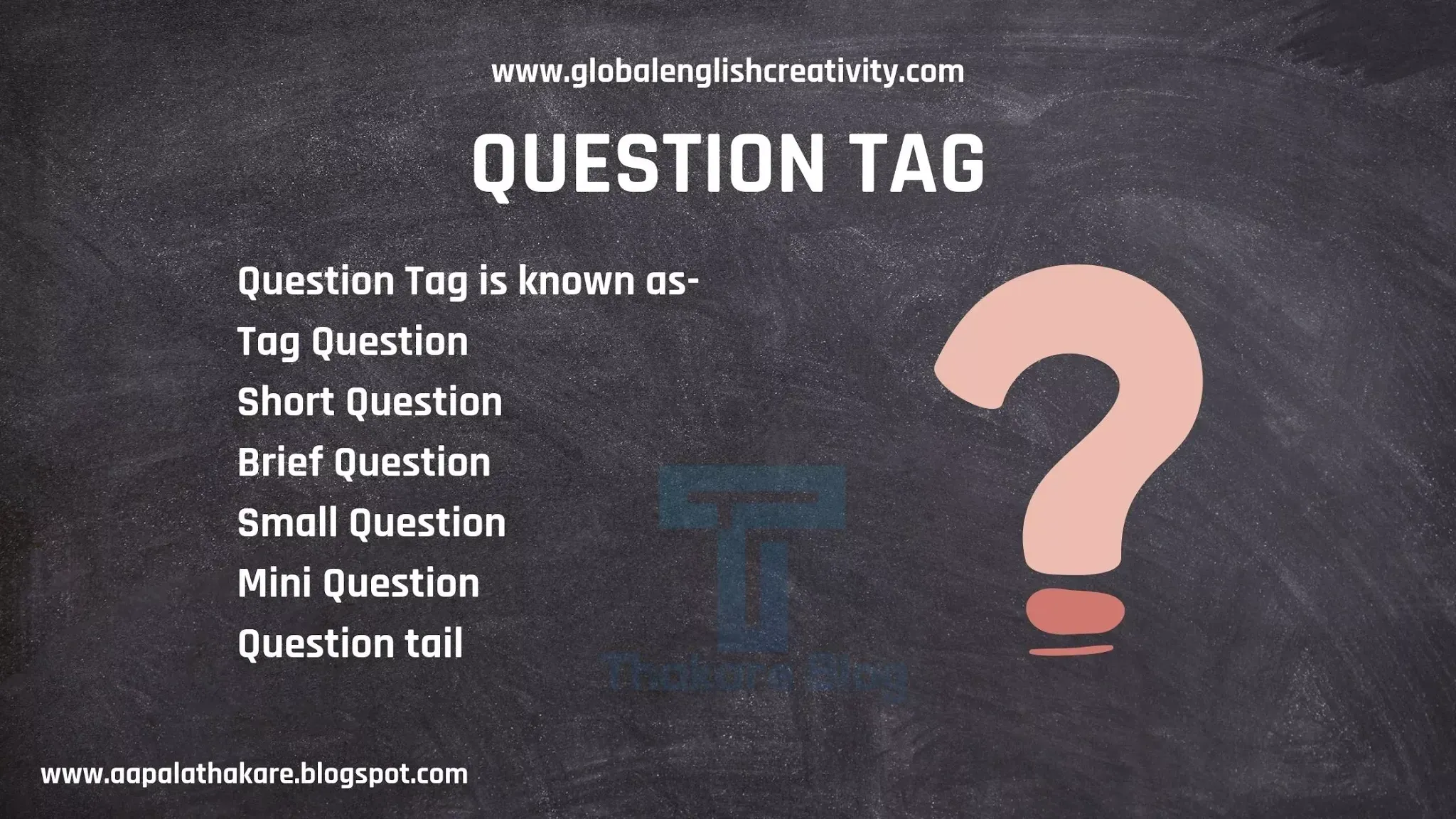QUESTION TAG | By-Prof. Dipak Burhade
QUESTION TAG
In previous three chapters we studied TENSES ,
DIRECT-INDIRECT SPEECH and MODAL-AUXILIARIES. Now I’m presenting one
more important topic in English Grammar, i.e. Question Tag.
Question Tags are an important part of our daily
communication. They perform different functions in different situations. They
can either be used to get a conversation started or keep it moving. They can be
a more polite way to request information.
Let’s study Question Tags with Prof. Dipak Burhade, with the help of his Website.

Click the link below to visit the Website
www.globalenglishcreativity.com
Question Tags play an important role in our daily activities and communication. We use them directly or indirectly. They perform different roles and functions in different situations. To get conversation started and to keep it going, Question Tags are effectively used. It is a typical construction in English.
Question Tag is known as-
- Tag Question
- Short Question
- Brief Question
- Small Question
- Mini Question
- Question tail
Question Tag consists of-
Helping Verb (positive or negative) + Pronoun + Question Mark
(was he? / didn’t they?)
Question Tag is–
- Used at the end of the sentence to ask for confirmation.
- Used in a more polite way to request information.
- Used at the end of Declarative or Imperative Sentences.
- A shortest form of question in English language.
Rules with examples-
RULE 1
If the sentence is positive Question tag will be negative.
- We are going to visit India next week, aren’t we?
- She has worked in the office since 2001, hasn’t she?
- I studied French for two years, didn’t I?
- George was driving a car, wasn’t he?
- Julie gets up early in the morning, doesn’t she?
If the sentence is negative Question tag will be positive.
- They haven’t played well yesterday, have they?
- Friends did not invite me for the ceremony, did they?
- The teacher was not explaining the point, was he?
- You were not talking with your friend, were you?
- The wind was not blowing when we reached there, was it?
RULE 2
If the sentence begins with This/That, use the pronoun ‘it’ in Q. T.
- This is the house of my uncle, isn’t it?
- That was the most difficult question, wasn’t it?
- This is not the way to go to the auditorium, is it?
- That wasn’t comfortable for you, was it?
If the sentence begins with These/Those, use the pronoun ‘they’ in Q.T.
- these are the major issues in our country, aren’t they?
- Those were the perfect tips for you, weren’t they?
- These are not the books of our library, are they?
- Those were not your close relatives, were they?
RULE 3
If the sentence is of ‘Simple Past Tense’, use the verb ‘did’ in Q.T.
- We saw a movie yesterday, didn’t we?
- ….They traveled UK last year, didn’t they?
- ….John played very well today, didn’t he?
- ….My father died in 2015, didn’t he?
If the sentence is of ‘Simple Present Tense’, use the verb ‘do/does’ in Q.T.
- Charles goes to gym every morning, doesn’t he?
- I drink coffee in the morning, don’t I?
- Julie gets up early in the morning, doesn’t she?
- Plants need soil and water to live, don’t they?
RULE 4
if the sentence is Imperative, use the Q.T. ‘will you?’
- Give me the ink-pen for today, will you?
- Please offer me your sit for some time, will you?
- Quit smoking from today, will you?
- Fire at the enemy, will you?
- Use mask at public places, will you?
- Write your papers with blue ink-pen, will you?
- Clean my office in half an hour, will you?
RULE 5
if the sentence begins with ‘Let’s’, use the Q.T. ‘shall we?’
- Let’s play basketball on the ground, shall we?
- Let’s study English Grammar today, shall we?
- Let’s go to watch movie today, shall we?
- Let’s take your brother with us, shall we?
- Let’s help our parents from tomorrow, shall we?
RULE 6
if the sentence begins with ‘There’, use the same word as pronoun in Q.T.
- There were many problems in the family, weren’t there?
- There can’t be a chance to enter, can there?
- There will be no difficulty in paper, will there?
- There is a special office for technical staff, isn’t there?
- There will be a space for parking, won’t there?
RULE 7
if the sentence begins with ‘Somebody, Nobody, Anybody, Everybody, Everything, Nothing etc.’, use pronoun ‘they’ in Q.T.
- ….Nobody helped them to carry their bags, did they?
- ….Anybody can solve this problem easily, can’t they?
- ….Everybody are dancing on the stage, aren’t they?
- ….Everything discussed properly, didn’t they?
- ….Nothing remained to eat, did they?
RULE 8
If the subject is plural use the pronoun ‘they’ in Q.T.
- All students appeared for scholarship exam, did they?
- My friends were playing on the ground, weren’t they?
- Boys are not writing a paper, are they?
- Teachers don’t waste their time in reading, do they?
- Schools are opening in December, aren’t they?
RULE 9
if there is a verb ‘am’ in positive sentence, use the verb ‘are’ in Q.T.
- I am writing properly, aren’t I?
- I’m going to participate in the camp, aren’t I?
- I’m taking Smith with me, aren’t I?
- I am thinking positively, aren’t I?
- I’m the captain of our school team, aren’t I?

सर्व रोज शैक्षणिक नवीन Update मिळवण्यासाठी आम्हाला खालील कोणत्याही लिंक वरून जॉईन करा.
- Thakare App Download -https://play.google.com/store/apps/details?id=com.thakare.blogapp
- What’s App- Next Update Group
- Telegram - https://telegram.me/aapalathakare
- Facebook Page- https://www.facebook.com/thakareblog
- Google News-https://news.google.com/publications/CAAqBwgKMNmHlgswrKutAw









कृपया सामान्य आयटी मार्गदर्शक तत्त्वांनुसार टिप्पणी द्या. प्रत्येक टिप्पणीची तपासणी केली जाते.
comment url